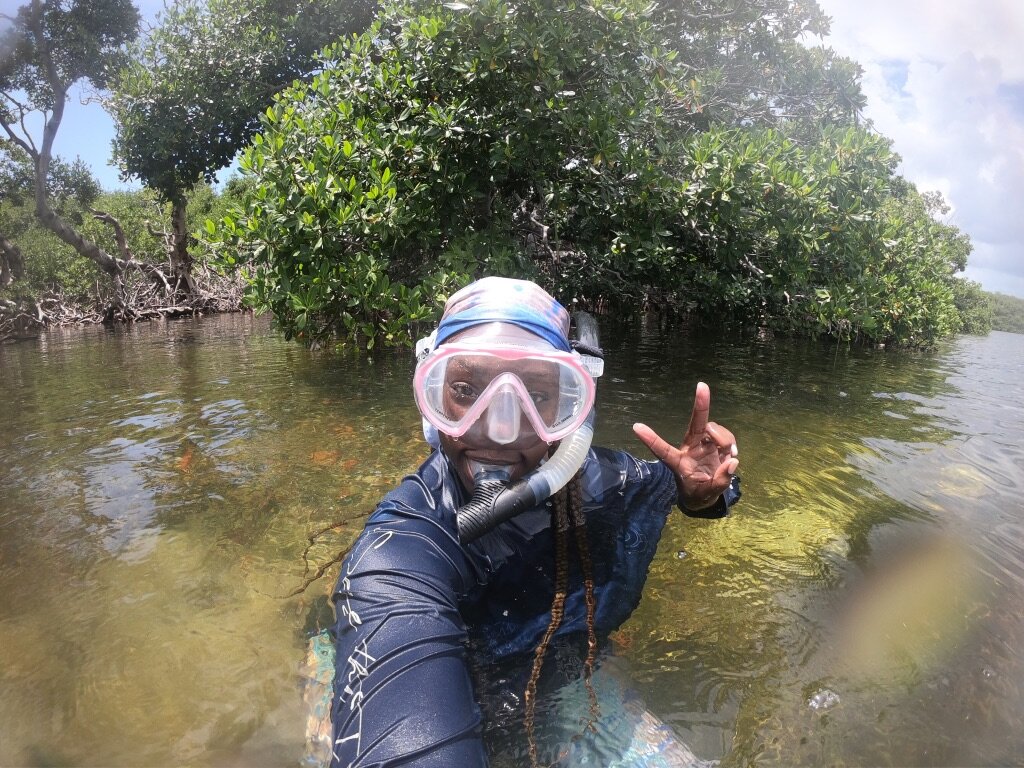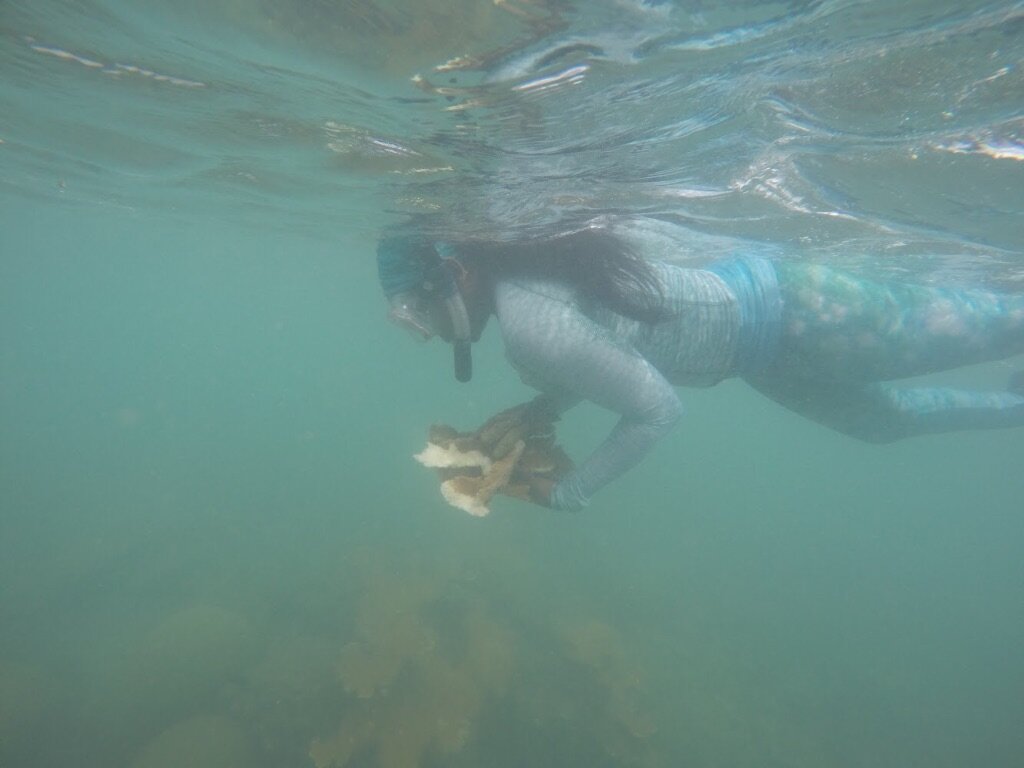Kayelyn Simmons; A Collection of Personal Experiences by Black Women in Marine Science
I am currently a PhD Candidate in Marine Science at North Carolina State University. I was born and raised in Stone Mountain GA, youngest of three daughters. I love the Atlanta Falcons and boiled peanuts are my favorite southern snack! I grew up staying active with outdoor activities, competition cheerleading, and running track. I love to travel and have also studied abroad in Australia for marine biology at James Cook University.
After high school, I attended Hampton University receiving my BS in Marine & Environmental Science and this is where I truly began my journey in the world of marine science. I completed several REUs, presented at conferences and decided to continue my education at Nova Southeastern University where I received my MS in Marine Biology. Throughout my marine science career, I have grown to love fisheries research as I love to see how the ocean connects coastal societies who not only rely on the ocean for their livelihood but also esteem to protect it too.
My dissertation research explores the connection between habitat complexity and reef fish biodiversity across a suite of marine reserves within the Florida Keys National Marine Sanctuary using two high-resolution, non-invasive tools – underwater soundscapes and structure-from-motion photogrammetry. Underwater soundscapes, the collection of biological, environmental, and anthropogenic sounds, is an emerging field useful in determining ecosystem health, behavioral patterns, and long-term monitoring based on the loudness of sounds, temporal patterns in sounds, and the diversity of sounds contributing to the soundscape. Specifically, my research uses underwater soundscapes to determine which sites are essential habitats for spawning and/or commercially important species such as snapper and grouper. Additionally, I use structure-from-motion photogrammetry to explore what characteristics make reefs more complex and more desirable for reef fish communities. Together, these methods can be a more effective long-term monitoring tool for holistic approaches in coral reef management and help understand the ecosystem-level impacts from chronic (i.e. overfishing, pollution) and acute (i.e. hurricanes) stressors.
Growing up in Atlanta there were several natural (nature) spaces I visited such as my first visit to the Chattanooga Aquarium and spending the night at Zoo Atlanta in second grade. In those settings, yes I always felt included and even in my suburban neighborhood I was one of three black families and we all played together not thinking about who not to include. There were only a few instances in high school I remember someone assumed I could not swim, but once I jumped in not caring about my hair everything was fine.
My earliest memories of the oceans are from fishing with my dad at Stone Mountain Park and our summer vacations to Hilton Head and Myrtle Beach in South Carolina. My dad used to go fishing offshore and I remember one day he caught he baby shark. He put it in a bucket and showed all the kids nearby before he released the shark back in the ocean. Before he passed, he took us to St.Thomas (USVI) and my mom claims I taught myself how to swim… I believe these events and memories have led me to a path to have compassion and stewardship toward the ocean and marine life.
I originally wanted to be a veterinarian for marine animals, but I was not clear on how to achieve that career path. A few veterinarians I shadowed in my hometown highlighted that working with marine animals would take several years of education and debt and most likely I would spend several years working on domestic or farm animals.
I decided to major in marine and environmental science hopefully to learn more about marine organisms and later pursue veterinary school. However, my REU at Rosenstiel School of Marine & Atmospheric Science (RSMAS-UM) changed my mind. I explored the spatial and temporal variation in the early life history of the bicolor damselfish (Stegastes partitus) using otolith age and growth. I really enjoyed going out to sea and seeing research methods come to life. I thrived during the dissections and enjoyed about the interaction between species life history and saw my first glimpse into coral reef ecology and how organisms’ life-history traits dictate decision making processes for the design of marine protected areas.
I became open water scuba certified in 2009 in Monterey Bay California during an internship with the Monterey Bay Aquarium Research Institute (MBARI). I immediately fell in love with diving and the whole immersion process of truly being in an environment …visually seeing things you have learned about or never seen before! I became AAUS scientific diver in 2012 and volunteered for lionfish removal studies in the Upper Florida Keys. Diving not only became a recreational outlet for me, but I also gained numerous friendships across the Florida Keys just simply connecting on diving or fishing stories.
Being a woman of color in marine science has been a wonderful and sometimes lonely journey for me. I have grown to be really resilient even at my lowest points because the options of seeking help are not always available or professionally, can put you in uncertain spaces. I am fortunate that my name deems me racially ambiguous, so I am at least on paper given a fair chance. In Australia, I felt no one knew what a non-celebrity African American person looked like so I did have to constantly challenge myself to put myself out there and hopefully give other African American women travelling abroad a good name…we do exist and we are open to cultural experiences just like other nations.
In-person, I have tried to capitalize on the “surprise” and many negative emotions accompanied with being the only black and woman in the field at times by just letting my actions speak for themselves. I am a good diver and marine ecologist; I have the same degree as this individual…these self-affirmations are necessary now for me to be successful in presentations and meeting with stakeholders.
I have experienced racism, especially since my particular work in marine science requires field, laboratory, and data analysis experience. As a PhD researcher, I develop and lead my own fieldwork and data collection and it has been a challenge to gain respect from others who help me in the field. Although I may be leading the dive or operating the boat, it is still assumed that I do not have the proper knowledge to conduct the project I created. I have also had circumstances where I am networking with stakeholders and someone not only speaks over me but shared a personal observation I made previously about my research as if it was their own words.
Sometimes it hard to tease apart if I am being judged for a being a woman in science or a black person in science…to me, this is the consequence of imperialistic attitudes…In manuscript working groups this can happen, but again perseverance and being more confident can help mentally with combating these issues.
I have met several women of color in marine science through international conferences outside of the US. I am fortunate I went to Hampton University and remained active in the ASLO Multicultural Program (https://www.aslo.org/opportunities-in-aslo/aslo-multicultural-program/) because I have met several women of color that truly see value in my research and have taken the time to invest in my professional development. However, outside of the small community from Hampton, I rarely meet African American women in science, but I have met several women of color in the Caribbean and Canada.
I attended a predominantly white high school before college and had become accustomed to my actions speaking for me. Through this, I have gained respect, friendships, and opportunities based solely on me and not the color of my skin. However, this has become a double-edged sword for me more recently in academic settings where the more vocal you are, the more respect you tend to gain.
Moreover, as a female scuba diver, I have had to overcome the idea of not being physically capable as men in my field. I believe many women divers feel this, yet for women of color we have an added layer of concern when diving: our hair. I have had a few co-workers watch/stare at me while I blow dry my hair after a dive…which is somewhat uncomfortable. Now, I take pride in getting protective natural hairstyles in the field and I regularly post how it is being natural working in the salt and sun for hours. I hope I can at least be an example to get rid of the stigma black women worrying about their hair in the ocean…maybe there would be more of us if we all shared protective styles for fieldwork at sea. Being in a field where no looks like you has heightened the presumably “normal” academic stressors such as the imposter syndrome, self-doubt, and even self-worth.
I believe in stewardship and action; these are two aspects of my life that I can really broaden within the field of marine science because the ocean environment is so closely related to human society. I am hoping to encourage diversity in marine science by continuing to demonstrate my passion for ocean conservation. I regularly volunteer for necropsies during marine mammal stranding events, conduct fish dissections for k-12 students, and coral restoration in the US and Puerto Rico in addition to attending science conferences. I also really love being a special guest speaking or hosting outreach events that bring communities together on conservation issues such as a soundscape block party I hosted in Key West in collaboration with stakeholders from the local area and dive shops. Lastly, within my working environment, I make an effort to join professional groups or organizations that advocate for diversity and multicultural experiences in STEM. I hope by sharing my adventures in the ocean on social media [lead by example] inspires more young women of color to consider marine science.
I wish the industry not only focused on diversity inclusion but also diversity investment where we do not use value when industries have met “diversity requirements”. It would be great to have equal opportunity for professional growth/investment, especially in academia.





